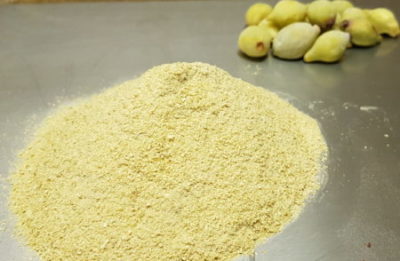Kakadu plum, freeze dried
Price on application
We are currently freeze-drying to order due to the demand for this product in our LIFE superfood and the other uses in the Karuah nutritional boosters range.
Our Kakadu plum freeze dried is made from the world’s highest fruit source of vitamin C. Please read the description below for more information and the possible concerns of which you need to be aware when sourcing this product.
Kakadu plum, freeze dried is made from the world’s highest fruit source of vitamin C. We make Kakadu plum, freeze-dried powder by lyophilizing (freeze-drying) only the edible portion of the fruits and typically get a minimum 17% vitamin C in the finished Kakadu plum powder.
However, there are a few considerations needed in choosing the best Kakadu plum freeze-dried powder if the end product is to boost nutritional intake or in fact, to have any beneficial effect at all:
Nutritional science is progressing as quickly as the sciences of sustainable energy, computing and Climate Catastrophe outcome’s and it is a case of the more we know, the more there is to know.
There is now global interest in the Kakadu plum (a.k.a. Kalari plum) some 32 years after I confirmed the high vitamin C content and we published the results. More recently, vitamin C content (and that of all the other vitamins) has been recognized as an inadequate measure of antioxidant activity and vitamin capacity is the new, accepted measure of efficacy.
This broadens our understanding of the biochemical reactions in which any single ‘alphabet’ vitamin is involved.
For example, vitamin C exerts its effects in conjunction with 4000 bioflavonoids, folates, fat soluble vitamins E and D, vitamin K2 and several co-factors including various minerals such as magnesium, iron, copper, zinc and selenium.
The good news is that the Kakadu (Kalari) plum and especially our Kakadu plum powder, includes a good dose of many of these additional components. It is also loaded with live enzymes since we take the frozen fruits, remove the flesh with specifically designed, cold-processing equipment and then freeze-dry the pulp preserving the full nutritional impact of this amazing fruit.
“WARNING, WARNING: Danger Will Robinson” (Caveat emptor)
Some suppliers of Kakadu plum powder are offering heat-dried, whole fruits that are jet milled or micronized to a powder. This means that half of this mix is the woody seed or pit and the dried flesh has been subjected to temperatures that degrade most of the active components. Vitamin C would be gone, enzymes denatured and many other heat sensitive components destroyed or rendered inactive. Users of this product are using the marketing name only and are at the low end of the nutritional market. Caution is advised when offered cheap Kakadu plum powder and the clue is a darker brown powder rather than a creamy yellow to pastel-green colour.
Another supplier had frozen Kakadu plum pulp available but their processor steamed the fruits in order to get the pulp off the seed. The heat would have destroyed live enzymes as well as the vitamin C capacity entirely and it is this vitamin which protects the integrity of the other beneficial components such as the organic acids (ellagic acid, gallic acid etc). So the antioxidant capacity of the pulp would have been significantly compromised.
The Australian food regulations also allow these shonky suppliers to add in synthetic ascorbic acid to bring back the vitamin C levels to that expected in a high quality, freeze-dried product so they can still make the claim of high vitamin C. Crazy I know, unethical but legal.
I guess the integrity of some suppliers gets ‘Lost in Space’ sometimes (some readers might need to Google this for it to make sense).
Additionally, let’s remember that Kakadu plum powder alone cannot be considered a complete food and even though it is an excellent source of many micronutrients, if it is superior nutrition that you are after, please try our LIFE (Lyophilized Indigenous Food Essentials™) product. LIFE is a unique, super nutritional and a core product in PhytoMedicine 3.0 as it delivers more superfoods of unparalleled quality than any other such preparation anywhere.
There is another consideration of which you may not be aware too.
Kakadu plums also contain calcium oxalate which can cause kidney problems in susceptible individuals but this oxalate has been shown to play a role in the stability of vitamin C and therefore, the vitamin capacity of the fruit pulp. It disturbs me that growers are now screening for low oxalate fruits not realizing that these will not be as nutritionally superior as higher oxalate fruits as the vitamin stability will deteriorate.
It is another case of chasing two rabbits which is what we have been doing for 50 years with modern fruits and vegetables taking valuable, healthy foods and selecting for larger, sweeter more robust cultivars with the ability to withstand the durability challenges of modern distribution channels. The final result is that most of our fresh produce these days is barely worth eating. Another example is with tomatoes in which the gene for red skin colour and controllable ripening, is on the exact gene location as for flavour. We can’t have both.
Along with highly processed edibles (I won’t call it food) we have consumable junk that makes us fat to obese, prediabetic to fully sick and suffering a host of the diseases of nutrition.
We need wild and near wild foods that have not been ‘scientifically improved’ but have evolved (with humans) in Nature and in ways that still support us with their ideal nutrition. This is why I choose to supplement my ‘healthy’ diet with LIFE. Do you?

